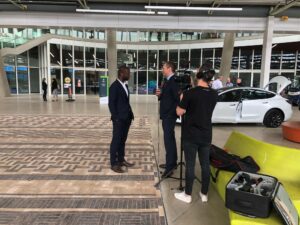Earlier this month, we hosted a thought-provoking panel discussion as part of the Tonsley Future Energy Summit. Facilitated by Penny Gale, our panellists Genéne Kleppe, (Digital Twinning Australia), Tom Pennington (PwC), Laura Mabikafola (Skills Lab, Sage Automation) and Helen Connolly (Commissioner for Children and Young People), explored the digital technology skills gap, what action businesses are taking to thrive in times of critical skill shortages, and what needs to change to accelerate growth in the energy sector and beyond.
Increasing the digital tech talent pool can be done in several ways:
- Upskilling and reskilling employees
- Interstate and global migration
- Grow SA’s own talent pipeline
From the discussion, it’s evident that a shift in mindset is needed to attract enough talent to address shortages and to challenge views about what skills are needed. One of the key takeaways from the session was to view digital technology skills as ‘life-skills’ that are embedded into everything that we do.
In the past, employers have looked for talent with traditional skill sets, however, softer skills are critical for emerging roles in digital technology such as problem solving, entrepreneurial and creative thinking.
What we are seeing is a shift to micro credentials enabling employees to upskill or gain new skills quickly to fill emerging roles within the sector, rather than waiting for degree qualified engineers.
As our panel explored the need to grow our own pipeline of talent, we heard that whilst the school curriculum provides a plethora of opportunities for children to gain skills, there’s still a sense of ‘pigeon-holing’ children into careers based on what they are good at from a young age. There’s a lot of talk about ‘jobs of the future’ and our children are eager to hear about what jobs there are in Greater Adelaide beyond the traditional roles, and the skills needed to do them.
We also heard that digital technology roles and training opportunities are still largely filled by men. There’s a critical role for emerging industries, educators, and parents to challenge the old roles and stereotypes to ensure that opportunities are available to all who want to be a part of the local talent pipeline.
By bringing together industry, educators, and children we can develop a shared understanding of technology and what skills are needed for emerging roles now and into the future.

